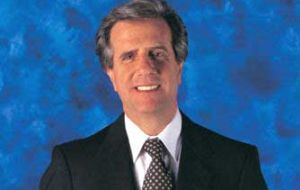MercoPress. South Atlantic News Agency
Uruguayan leader in Chile to promote exports to third countries
 Pte. Tabare Vazquez
Pte. Tabare Vazquez Uruguayan president Tabare Vazquez together with several ministers and a delegation of businessmen arrived Monday in Santiago for a two days visit to Chile with the purpose of exploring new market opportunities and export possibilities for Uruguay.
Both countries are scheduled to sign an agreement which opens the possibility for Uruguay to take advantage of the many free trade agreements Chile has signed with over fifty countries. Uruguay, a founding member of Mercosur, which has growing trade and market access differences with neighboring Argentina and Brazil, is openly involved in an aggressive initiative to increase foreign trade outside the block. "Chile has become a reference for the region as far as economic policy is concerned, particularly since the last governments have been successful in coordinating growth with social justice and fiscal discipline", said Uruguay's Economy Minister Danilo Astori in a brief exchange with Uruguayan reporters during the chartered flight to Santiago. He also underlined that Uruguay is interested in attracting Chilean investors who already have assets in forestry, paper manufacturing, port logistics, farming and other Uruguayan industries. "Chile not only has offered to act as a jumping board for Uruguayan exports but agreed to work on legislation to avoid double taxing" revealed Astori. The agreement contemplates several fields, cooperation, technical assistance and the exchange of trade experience and data between the host country's export promoting office Pro Chile and the Uruguay XXI Institute, a non profit organization which represents a few Uruguayan industries. According to Astori the agreement should help a joint promotion and coordination of exporting efforts to third countries, with certain products to be manufactured through the complementation of Chilean and Uruguayan companies, to such important markets as China and India. Pro Chile and Uruguay XXI will also promote joint training workshops, business forums and seminars as well as cooperation programs including exchange of technical staff. The agreement has been under negotiations since September 2006. A bi national commission with government officials and private sector representatives will be created, with the purpose of monitoring advances in the agreements to be signed. The commission is scheduled to meet twice a year. Astori admitted Uruguay has suffered difficulties and disappointments with Mercosur but "it remains a strategic trade and political block for Uruguay, and we are determined to improve it". "We're considering the possibilities of accelerating Mercosur convergence with Chile", which means that the partial lowering of tariffs process, originally set for 2012, "can be achieved by 2010". President Vazquez is traveling with Economy minister Danilo Astori; Industry, Energy and Mining minister Jorge Leptra; Foreign Affairs minister Reinaldo Gargano and Defense minister Azucena Berrutti plus a delegation of fifty businessmen headed by the president of the country's Chamber of Industry, Diego Balestra. Vazquez will meet President Bachelet at the presidential palace, Casa de la Moneda and on Tuesday will visit the city of Valparaíso, seat of the Chilean Parliament. In interviews with Chilean newspapers previous to his trip, President Vazquez underlined the ideological affinities with the Socialist administration of President Bachelet and the fact that both leaders are doctors, (Bachelet a pediatrician and Vazquez, oncologist). Vazquez also talked about the difficulties Mercosur junior members (Uruguay and Paraguay vs Argentina and Brazil) have to face and emphasized the pivotal role Chile can play, as an associate member of Mercosur, in helping Uruguay have access to new markets. Regional political analysts describe Uruguay as belonging to the pragmatic group of Socialist elected governments such as Chile, Brazil and Peru, as opposed to the radical group led by Venezuela's Vazquez and close associates in Bolivia, Ecuador and to a certain extent Argentina.




Top Comments
Disclaimer & comment rulesCommenting for this story is now closed.
If you have a Facebook account, become a fan and comment on our Facebook Page!